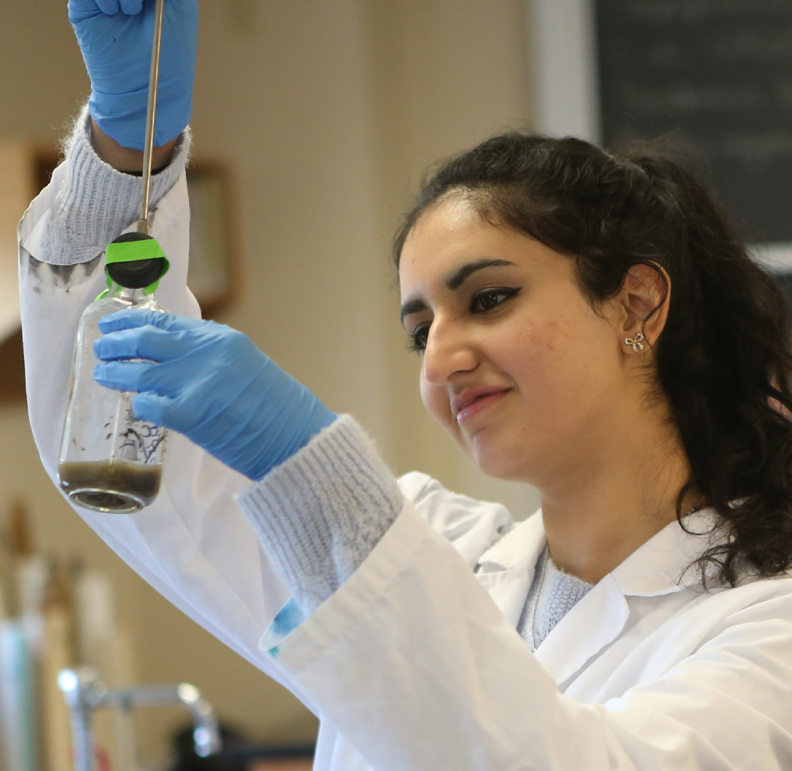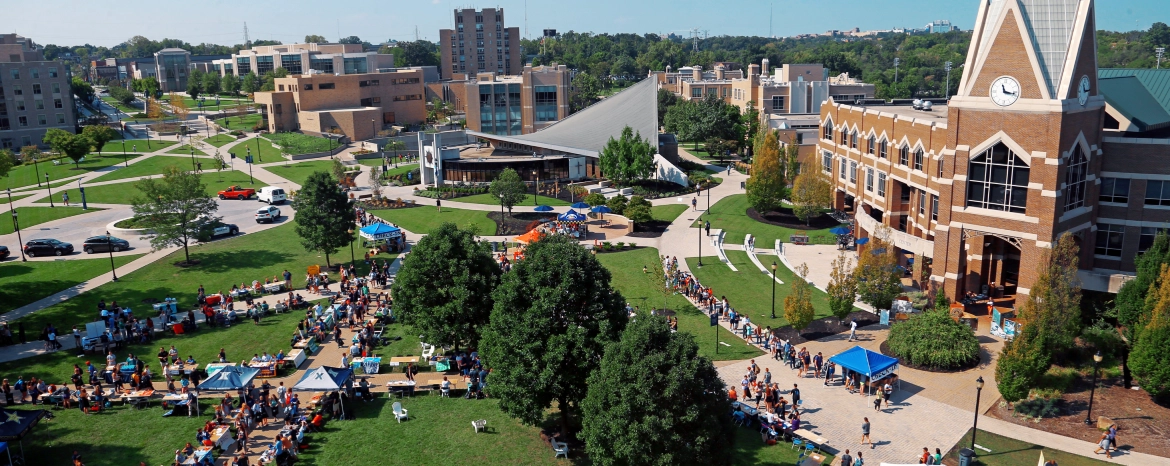Biochemistry
Bachelor of Science

Our BS in Biochemistry program ensures you actively engage in mastering the fundamental principles of chemistry and biochemistry, providing specialized training designed for a deep understanding of the chemical processes and substances within living organisms.
Fall
- CHEM 160: General Chemistry I............ 3cr.
- CHEM 161: General Chemistry I Lab............ 1cr.
- BIOL 160: General Biology I............ 3cr.
- BIOL 161: General Biology I Lab............ 1cr.
- MATH 140: Concepts of Calculus............ 4cr.
- ENGL 101: Composition............ 3cr.
- CORE 100: First Year Seminar............ 0cr.
- CORE 101: First Year Co-curricular............ 0cr.
Spring
- CHEM 162: General Chemistry II............ 3cr.
- CHEM 163: General Chemistry Lab II............ 1cr.
- CHEM 180: Intro to Chemical Enterprise............ 3cr.
- BIOL 162: General Biology II............ 3cr.
- BIOL 163: General Biology II Lab............ 1cr.
- STAT 146: Introductory Biostatistics............ 3cr.
- THEO 111: Theological Foundations............ 3cr.
- CORE 102: Co-curricular............ 0cr.
Fall
- CHEM 240: Organic Chemistry I............ 3cr.
- CHEM 241: Organic Chemistry Lab I............ 1cr.
- PHYS 160 : College Physics I............ 3cr.
- PHYS 161: Introductory Physics Lab I............ 1cr.
- PHIL 100: Ethics as Intro to Philosophy............ 3cr.
- Second Language I............ 3cr.
Spring
- CHEM 242: Organic Chemistry II............ 3cr.
- CHEM 243: Organic Chemistry Lab II............ 1cr.
- PHYS 162: College Physics II............ 3cr.
- PHYS 163: Introductory Physics Lab II............ 1cr.
- PHIL 200: Philosophical Perspectives............ 3cr.
- Second Language II............ 3cr.
Fall
- CHEM 220: Biophysical Chemistry............ 3cr.
- CHEM 221: BioAnalytical Lab............ 1cr.
- CHEM 440: Biochemistry I............ 3cr.
- CHEM/BIOL Elective............ 3cr.
- HIST 199 - Historical Perspectives............ 3cr.
- Humanities Elective............ 3cr.
Spring
- CHEM 300: Research Ethics............ 3cr.
- CHEM 442: Biochemistry II............ 3cr.
- CHEM 441: Biochemistry Lab II............ 1cr.
- BIOL 230: Genetics............ 3cr.
- BIOL 231: Genetics Lab............ 1cr.
- CHEM 400: Research............ 1cr.
- ENGL 205: Literature and Moral Imagination............ 3cr.
Fall
- CHEM 340: Instrumental Analysis............ 3cr.
- CHEM 420: Inorganic Chemistry............ 3cr.
- CHEM 400: Research............ 1cr.
- CHEM/BIOL Elective............ 3cr.
- CHEM/BIOL Elective Lab............ 1cr.
- E/RS Elective............ 3cr.
- Social Science Elective............ 3cr.
Spring
- CHEM 341: Instrumental Analysis Lab............ 1cr.
- CHEM 400: Research............ 1cr.
- General Elective............ 3cr.
- Creative Perspectives............ 3cr.
- Theological Perspectives............ 3cr.
- Elective............ 3cr.
- CORE 499............ 0cr.
The sample course sequence above illustrates class offerings for the Biochemistry major. Consult the official Xavier University course catalog for detailed registration and advising information.
High Medical School Acceptance Rate
Xavier students have an 86 percent acceptance rate to medical schools (5-year average, Class of 2023), compared to 40 percent nationally.
Career Preparation
Xavier's Career Development Office assists students in their search for employment by offering individual career counseling sessions, conducting workshops and maintaining an employer database. More than 100 nationally known companies visit the campus annually to interview graduating seniors for open positions.
Bioanalytical Chemistry (CHEM 221)
Bioanalytical Chemistry is a combined lecture and laboratory course focusing on the practical application of both wet chemical and instrumental analytical methods. Emphasizing substances relevant to clinical contexts, this course provides hands-on experience in analyzing and interpreting various compounds of interest.
Research Ethics (CHEM 300)
An introduction to the nature and use of the chemical literature, general research procedures, technical report writing, and computerized literature searches.
Biochemistry (CHEM 440)
This course covers the intricacies of proteins, carbohydrates, lipids and nucleic acids. This course explores their structural components, distinctive properties, and their vital roles in cellular metabolism.
Inorganic Chemistry (CHEM 420)
This course is an exploration of contemporary theories on bonding and structure, spectroscopic techniques, redox chemistry, and reaction mechanisms. The course covers a range of topics including coordination compounds, organometallic clusters and catalytic processes.
Alpha Epsilon Delta (Pre-Med Honor Society)
Alpha Epsilon Delta (AED) is a national pre-health honors organization for juniors and seniors. Their main focus is service to the Cincinnati community, with opportunities to serve at places like the Ronald McDonald House and Cincinnati Children's Hospital.
Biology Club
The Biology Club is not exclusive to just biology majors or other related majors, but welcomes anyone and everyone who are interested biology. Past events have included hiking trips, Break Out Games, scavenger hunts and trips to the zoo and aquarium.
Alchemyst Club
The Alchemyst Club was established to inform and educate the Xavier community about the merits of science, especially chemistry and to lend support to the Xavier chemistry community. The club's purpose is to facilitate the propagation of chemical knowledge and to assist in making the chemistry major a viable option.

There’s nothing like experiencing campus for yourself. Schedule a visit and earn a $1,000 grant.*
Program Features
Gain invaluable hands-on experience with advanced instrumentation, and even have opportunities to present your research findings at conferences.
With small class sizes, you'll benefit from personalized mentorship, direct guidance and one-on-one collaboration, ensuring you receive the support needed.
For a few extra credit hours, your degree can be certified by the American Chemical Society (ACS), giving you a competitive edge in the job market and for graduate school applications.
Xavier students have an 86 percent acceptance rate to medical schools (5-year average, Class of 2023), compared to 40 percent nationally.
These four chemistry graduates are making big impacts in science, business and education. Read more about their journeys to success.
When Xavier chemistry professor Rick Mullins, Ph.D. began his career, he had many hopes for how he might teach, support and guide students. One thing he didn’t expect: to officiate a former student’s wedding.
FAQ
Our Biochemistry program offers a rigorous and rewarding path to becoming a leader in this vital scientific field. Learn more.
Biochemistry is the study of the chemical processes that occur within and relate to living organisms. It is a fundamental science that combines biology and chemistry to explore the molecular basis of life.
In essence, biochemistry seeks to understand how biological molecules give rise to the processes that happen inside and between cells, which ultimately explains the structure and function of tissues, organs, and entire organisms.
Key Areas of Study
Biochemistry focuses heavily on the structure, function and interactions of the four major classes of biomolecules:
- Proteins: The workhorses of the cell, including enzymes that catalyze nearly all cellular reactions.
- Nucleic Acids (DNA and RNA): Molecules that store and transmit genetic information (the basis of molecular biology and genetics).
- Carbohydrates: Primary energy sources and structural components.
- Lipids (Fats): Components of cell membranes and energy storage.
Real-World Applications
Because it is the foundation for understanding all biological processes, biochemistry has significant applications in many fields, including:
- Medicine: Investigating the molecular causes of diseases (like cancer, diabetes, and genetic disorders) and developing new diagnostic tools and drug therapies.
- Nutrition: Studying how dietary components are broken down, used for energy, and affect health.
- Agriculture: Developing disease-resistant crops, new fertilizers, and methods for improving food production.
- Biotechnology: Using biochemical processes and genetic engineering to create useful products, such as developing vaccines or genetically modifying microbes.
A biochemistry degree opens up a wide range of career opportunities, thanks to the strong analytical, problem-solving, and technical skills it imparts. Here are some common career paths:
Research
- Biochemist: Conducting research in various fields, such as molecular biology, enzymology, or metabolic pathways
- Research scientist: Working in industries like pharmaceuticals, biotechnology, or food science
- Academic researcher: Teaching and conducting research at universities
Industry
- Pharmaceutical scientist: Developing new drugs and medications
- Biotechnologist: Developing new products and processes using biological techniques
- Food scientist: Developing new food products and ensuring food safety
- Clinical laboratory scientist: Analyzing biological samples in a clinical laboratory
Government and Non-profit Organizations
- Environmental scientist: Studying the environment and its impact on human health
- Forensic scientist: Analyzing evidence to solve crimes
- Public health specialist: Promoting public health and preventing disease
Chemistry and Biochemistry are related fields, but they have distinct focuses.
- Chemistry is the study of matter, its composition, properties, and the changes it undergoes. Chemists explore a wide range of substances, from simple molecules to complex compounds.
- Biochemistry is a specialized branch of chemistry that focuses on the chemical processes that occur within living organisms. Biochemists study the molecules and reactions involved in biological processes like metabolism, DNA replication, and enzyme activity.
In essence, Chemistry is the broader field that studies all matter, while Biochemistry is a specific branch focused on the chemistry of life.
Yes. The University Scholars Honors Program offers incoming students a more challenging curriculum and close support from professors while completing their undergraduate degree. Acceptance into the program is highly selective and includes a $2000 travel grant.
Located in Cincinnati, Ohio
Cincinnati, Ohio is a city made for exploration. With parks, bike trails, and scenic riverbanks, there's more than just your dorm room to call home.
Biochemistry Program at Xavier University
Xavier University’s College of Arts and Sciences challenges students to develop an integrated understanding of humanity, the world, and God by pursuing the questions raised in Xavier's core and departmental curricula. The College of Arts and Sciences is the oldest and largest college at Xavier University. The college provides an excellent liberal arts education in the Jesuit tradition that prepares students for careers, professional or graduate school, and life in a global society.
Xavier University is a private university located in Cincinnati, Ohio, providing a liberal arts education in the Jesuit Catholic tradition. Founded in 1831, the University is the sixth-oldest Catholic university in the nation. It has been ranked among the top 10 master's-level universities in the Midwest by U.S. News & World Report for the past two decades. The Princeton Review names it one of the "Best 385 Colleges in America."